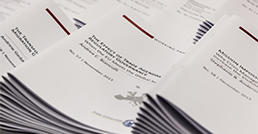New KFG Working Papers Published
Dec 03, 2015
KFG Working Papers
Image Credit: Business Fotografie Inga Haar www.business-fotografie.de/
In the last months, several fellows have been publishing KFG Working Papers on a broad range of interesting topics.
Working Paper No.64 “Early, Old, New and Comparative Regionalism: The Scholarly Development of the Field” by Fredrik Söderbaum
Abstract
By tracing the intellectual roots and main characteristics of the scholarly debates on regionalism in different time periods, this Working Paper seeks to contribute to the consolidation of a fragmented field of study in search of its own intellectual history. The paper identifies four main intellectual phases: early regionalism, old regionalism (in both Europe and the developing world), new regionalism, and the current phase of regionalism, referred to as comparative regionalism. It argues that progress in the study of (comparative) regionalism requires a better understanding of the intellectual roots of the field and an acknowledgment of the many types of regions that have occurred in many different historical contexts.
Click here to view this working paper.
Working Paper No.65 “Estimating the Position of the European Union: A Tool for Macro-Quantitative Studies” by Detlef Jahn and Nils Düpont
Abstract
This paper develops an index for estimating the position of the European Union in various policy fields and ideological dimensions. The index is designed for macro-comparative stud-ies, which currently mainly use a dummy variable as a proxy for the impact of the EU on do-mestic politics, policies and outcomes. The index assesses the position of each European insti-tution (European Council, Council of Ministers, Commission, and European Parliament) and takes the frequently changing decision making rules between these institutions into account. Based on an actor-centered approach the index links policy preferences of actors with formal and informal decision making rules. The index thereby appraises the impact of the EU on its member states in greater detail and is therefore suitable for analyses of most urgent research questions concerning the relationship between the EU and its member states. Furthermore, the index allows a calculation of the positional and ideological misfits between the EU and each individual member state on an annual basis. Questions about an ideological bias of the EU or problems of compliance can thus be analyzed with greater precision than before. To illustrate our index we use data on the left-right dimension, which has proven to be highly relevant in macro-quantitative studies. The data is available for quarterly and annual longitudinal analyses from 1966 to 2012.
Click here to view this working paper.
Working Paper No.66 "Supranational Courts as Engines for Regional Integration? A Comparative Study of the Southern African Development Community Tribunal, the European Union Court of Justice, and the Andean Court of Justice” by Christina Fanenbruck and Lenya Meißner
Abstract
This paper investigates the role of regional supranational courts in advancing integration within regional organizations by analyzing three courts. Over the course of the last decades the design of the European Court of Justice has been emulated by several other supranational courts, two of which are studied in this paper. The court of the Southern African Development Community (SADC), the SADC Tribunal (SADCT), as well as the court of the Andean Community (CAN), the Andean Court of Justice (ACJ), both share the design features of the ECJ. Knowing that the ECJ has significantly contributed to integration within the European Coal and Steel Community and later the European Communities, it could be assumed that an emulated design may engender a similar effect on integration in other regional settings. Empirically, this has been the case neither in SADC nor in CAN. Therefore, this paper considers several explanatory factors extracted from theory and literature in order to establish reasons for this failure of the organizations to integrate. The analysis shows that legitimacy and problem pressure are the two main variables that indicate the effective advancement of integration. In the following analysis, it is argued that while the SADCT failed to foster regional integration due to its suspension on grounds of it lacking legitimacy before having the opportunity to fully unfold its strengths, the ACJ failed to advance integration because it remained passive due to lacking problem pressure.
Click here to view this working paper.
Working Paper No.67 “South American Regionalism: Explaining the Foundation of UNASUR” by Luisa Linke-Behrens
Abstract
As the first exclusively South American cooperation scheme and the new centerpiece of post-hegemonic regionalism in the region, the foundation of the Union of South American Nations (UNASUR) has recently attracted scholarly attention. While this event has been studied by means of descriptive narratives and frequently from the angle of post-hegemonic approaches, this paper draws on neofunctionalism, intergovernmentalism, the regional powers approach, and the security community approach to explain why UNASUR was founded. It thereby offers a systematic and theoretically informed account of the foundation of UNASUR as a particular phenomenon and, by extension, of the status quo of regionalism in South America. Specifically, I examine context conditions, such as the power shift in favor of Brazil, the anti-neoliberal social paradigm, and the decline of hemispheric cooperation; the interests of Brazil, Venezuela, and Argentina, and the region-wide shared interest in stable peace and energy integration; and finally, the main actors initiating and driving the establishment of UNASUR, namely the Brazilian and Venezuelan government. I conclude that the security community approach is best able to explain the founding of UNASUR.
Click here to view this working paper.
Next publications in the KFG Working Paper Series:
“Primary or Secondary? Regionalism's Multiple Roles in Brazil's International Emergence” by Stephen Clarkson, Abdi Aidid, Felix Cowan, Christine Farquharson, John Henderson, Jason Li, and Anna Postelnyak.
"So far, so Functional? Examining Functional/Counter-functional Dynamics in Authoritarian Regional Cooperation" by Ed Stoddard.
"Piling On: The Rise of Sanctions Cooperation between the US, EU, and Regional Organizations" by Inken von Borzyskowski and Clara Portela.
